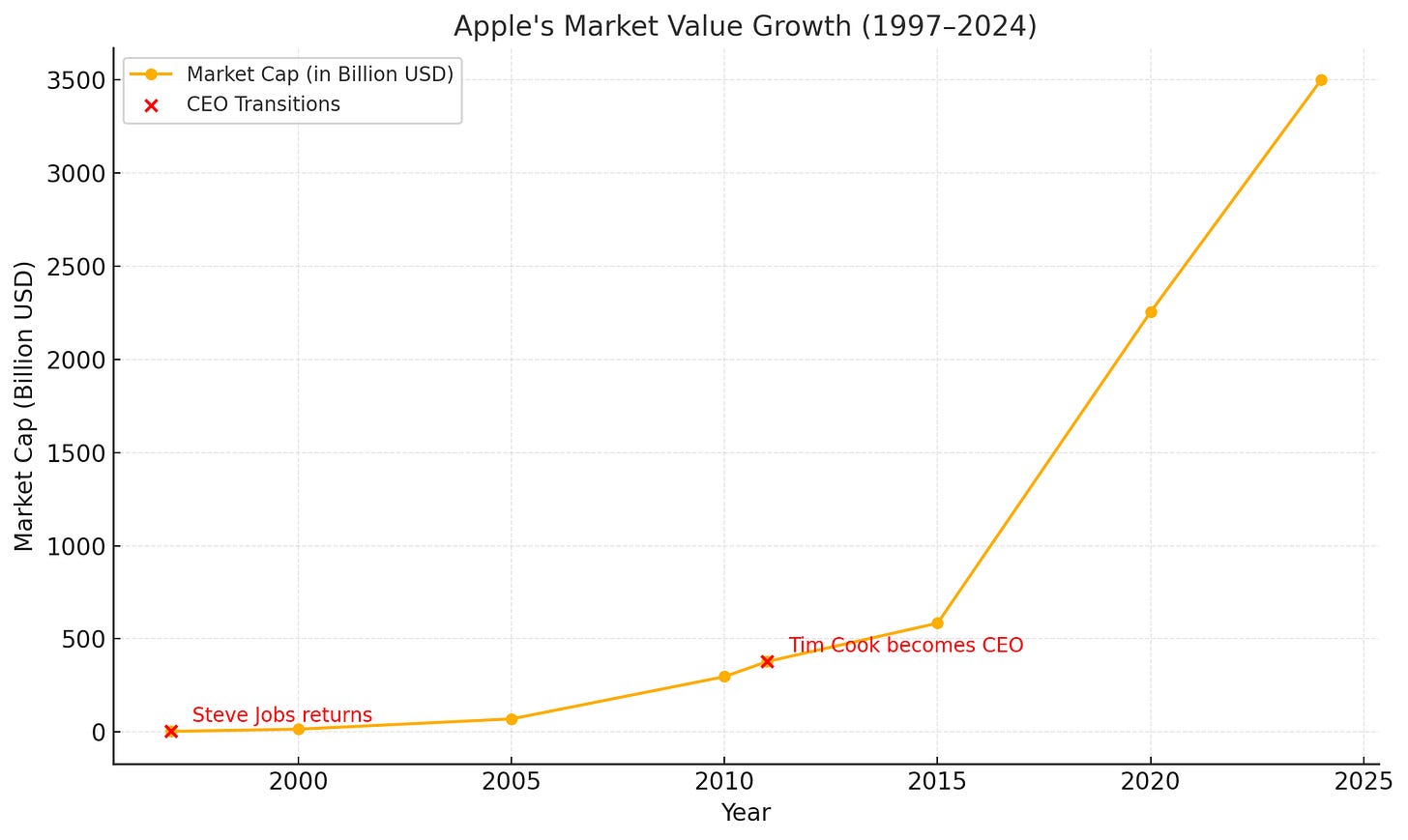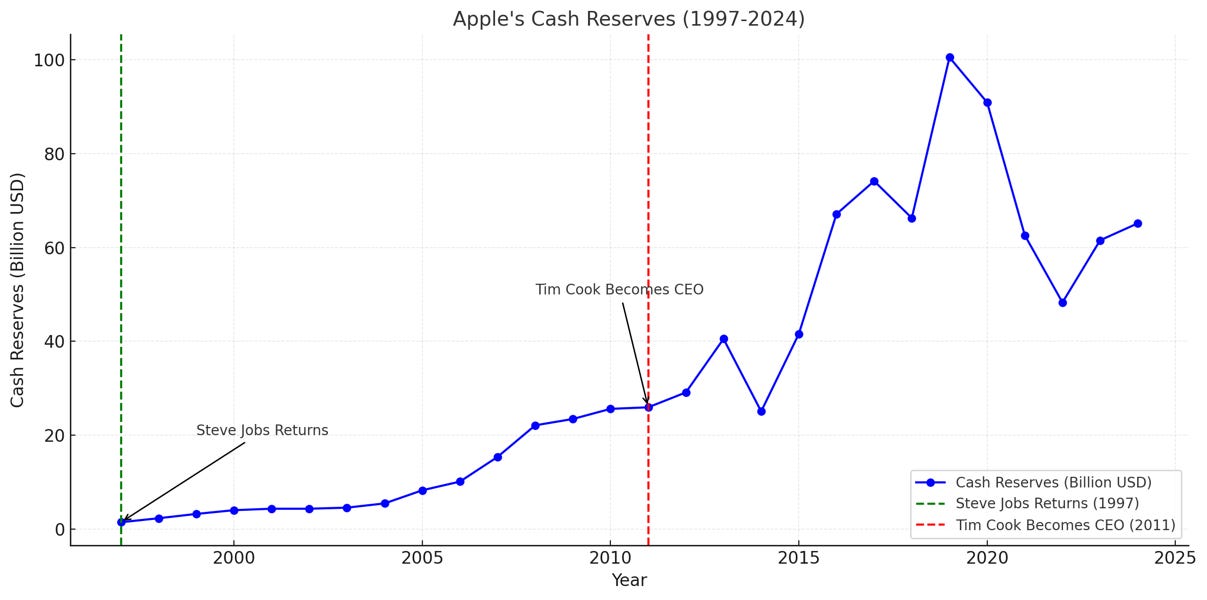#33 - The iPhone Salesman
I had to get a new iPhone last week.
My iPhone 7’s battery life was non-existent and the general UX was becoming unusable. Despite my love for the home button I had to bite the bullet and upgrade.
The Apple Store in midtown Manhattan was riddled with employees in matching red shirts. And I soon learned that these “Geniuses” were actually sales reps in disguise - within 30 seconds of walking in I was accosted.
The rep was great. Super cool, not pushy, asked a lot of questions, and knew a ton about the trade offs for each product based on what I wanted. He showed me some awesome functionality with Apple Intelligence and won me over with an incredible demonstration of automated email drafting - something that I could very much see myself becoming dependent on.
I bought the newest iPhone 16 for ~$1000. Significantly more expensive than the 13, 14, or 15 models. But they don’t support Apple Intelligence. Something I now find myself valuing significantly.
Without the rep giving me FOMO for advanced AI functionality, I would’ve bought an older (much cheaper) model solely based on better battery life.
Vaporware
When I got home I was annoyed. I opened the phone and (obviously) went to test out Apple Intelligence. When nothing he demoed to me was available I realized I was sold on product roadmap.
While I’m not returning the phone (too much hassle, don’t want to sync to another device, etc.) it did get me thinking about how Apple will continue growing in the coming years.
They’re whole schtick is focused on their products being simple, intuitive and with every last detail (both inside and out) designed to perfection.
Now they have sales reps hawking half-baked products because new iPhone releases no longer sell like Air Jordans.
When you need to hire a fleet of sales people to move inventory - because the product’s innovations can no longer sell themselves - you question whether something more existential is happening at the most valuable company on the planet.
Will their bull run continue despite not having a real breakthrough innovation since the iPhone?
The Golden Goose
While it’s no secret they’ve lost a level of innovation post-Jobs, it’s clear that Tim Cook as his successor was the right move.
An expert in supply chain management and operational efficiency, he took a very valuable company to extraordinary heights. This largely through production optimization, negotiating incredible deals with suppliers (primarily Foxconn, and AppStore developers) and financial engineering practices that gave Apple the largest cash pile in the history of the world.
Essentially, he took one of the fastest growing and most innovative companies of all time, and made it the most profitable on the backs of Apple’s existing ecosystem.
Since taking the helm, however, there hasn’t been a ‘real’ breakthrough product.
Cook’s success has been focused on milking all of the remaining value out of the existing portfolio. Take a look at Apple's revenue breakdown by product line for the most recent quarter (Q3 2024):
iPhone: $39.30 billion, representing approximately 45.8% of total revenue. This is slightly down year-over-year by 0.94%.
Services: $24.21 billion (28.2% of revenue), showing significant growth of 14.14% year-over-year.
Wearables, Home, and Accessories: $8.10 billion (9.4% of revenue), with a small decline of 2.26% year-over-year.
iPad: $7.16 billion (8.4% of revenue), which increased by 23.63% year-over-year, partly due to the introduction of new models.
Mac: $7.01 billion (8.2% of revenue), reflecting modest growth of 2.46% year-over-year.
In total, Apple reported $85.78 billion in revenue for Q3 2024, marking a 4.87% increase compared to the same quarter last year. Not bad, but it’s clear growth has slowed significantly.
The bright spot, Services, include things like the AppStore, Apple TV, Apple Music, Apple Care etc. This growth is extremely high-margin relative to its hardware counterparts and very much aligns with Tim Cook’s maniacal focus on the business fundamentals.
However, none of these revenue generators represent anything beyond extracting marginal value within the existing Apple ecosystem. The massive financial success of blockbuster products like Airpods and the Appstore is totally dependent on people owning an iPhone.
As a corollary, Cook shut down the Apple Car project, and is very close to shutting down their Apple Vision (VR headset) product too. These projects represent opportunities for major disruption that could carry the next generation of growth. But they’ve been unable to execute.
This means that if a major disruption to the iPhone occurs, just like they did to Blackberry, the rest of their portfolio is in trouble.
Meta’s Quest, and even Neuralink, could wreak havoc if they catch on in a big way as their “jobs to be done” could replace the need for phones, computers, keyboards, etc. - gutting Apple’s golden goose.
What now?
So, is this newly minted sales force a sign of “all things must go” to generate as much cash as possible ahead of a downfall? Perhaps.
But perhaps Cook’s calculus is a bet on his same tried-and-true playbook. And a bet on a potential wave of hardware disruption being way farther in the future than most of us think.
Apple Intelligence is, right now, nothing more than vaporware. But Apple still absolutely dominates the hardware space - from a revenue, profit and per unit device perspective - they still run laps around the next closest competitor in the phone, computer and tablet market.
What’s more is they finalized a partnership with OpenAI, the company most likely to dominate the next wave of technological transformation. As long as Cook can execute on ensuring that partnership powers the next wave of devices, they are well-positioned to fend off significant disruption.
If this holds true, Apple just needs to execute on two things:
Ensure they get as many people to upgrade to devices that are AI-enabled. Hence, the sudden influx of sales reps heavily incentivized to get folks locked into the new, AI-enabled devices.
Ensure that, ahead of the iPhone 17’s release next year, Apple Intelligence advances to the point of making it a “must have” device to maintain their relative premium in the market. Ideally getting the functionality to the point where those reps slinging 16’s are unnecessary.
Tim Cook clearly realizes that he is not a “breakthrough product” guy.
He is just a master at business model innovation → ensuring that Apple’s existing portfolio advances enough to support the next 10 years of profitable growth. Largely on the backs of other people’s inventions to minimize operating costs.
Continuing to execute against this will ensure Apple keeps generating more cash than the GDP of many developed nations.



